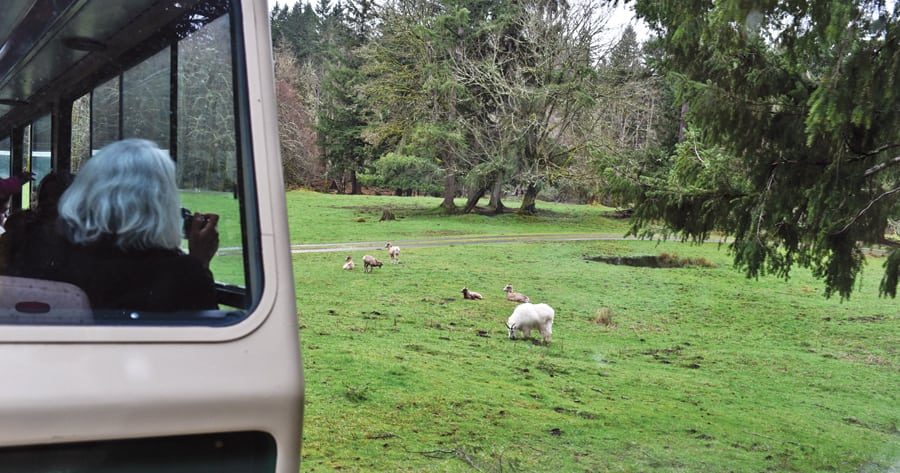
Home » Northwest Trek Wildlife Park gives visitors close-up view of wildlife
Northwest Trek Wildlife Park gives visitors close-up view of wildlife

April 14, 2016
Northwest Trek in Tacoma is part zoo and part Wildlife Park. The park is situated among towering Douglas fir trees in 725-acres 35 miles southeast of Tacoma off State Highway 161 near Eatonville.
Northwest Trek, which is accredited by the Association of Zoos & Aquariums, is dedicated to conservation, education and recreation by displaying, interpreting and researching native Northwest wildlife and their natural habitats.
The park offers visitors a 50-minute narrated tram tour along a five-mile loop of its 435-acre free-roaming area featuring meadows, lush forests, and thick woodland trails. From the moment visitors hop on the tram, it’s like a game of Where’s Waldo. The immersive tour takes visitors just feet away from herds of American bison and Roosevelt elk, bighorn sheep, mountain goats, deer, caribou and moose and one moose, and spotting them is half the fun. A knowledgeable naturalist guides you through the forest and offers interesting facts and information on the different free-roaming animals.
All the free-roaming animals are herbivores and part of the bovine family. All the animals are native to the Northwest and can be found in in the wild in Washington, except the bison, which were overhunted in the 1800s and now only exist as managed herds. Northwest Trek is home to more than 200 animals representing 43 species.
Visitors can also walk forested trails and paved paths through the forest to view golden eagles, snowy owls, and large predators like grizzly bears, wolves, cougars, black bears, foxes, coyotes, lynx, and bobcats, all in natural, up-close enclosed exhibits. In the smaller, wetland areas, you’ll see beavers, fishers, and wolverines.
During daily Trailside Encounters, animal keepers offer talks, giving visitors a closer look at some of the animals.
The park also offers specialized tours for photographers looking to capture the perfect picture from a tram. Keeper’s Tours allows visitors to climb on the bed of a truck and see park staff feeding free-roaming animals during daily morning rounds. During the elk-breeding season in September, visitors can enjoy a two-hour guided tour and participate in listening for elk calls, notice special postures and, on occasion, see the bull elk spar. Those tours are $60 for Northwest Trek members and $65 for all others.
Northwest Trek also offers activities like zip lining and challenge courses carefully positioned through the park’s tree canopy. The courses offer fun and educational opportunities for children as young as 5 and adults of all ages. Each course contains sections of zip line separated by barriers that visitors must walk, climb or crawl over.
The challenges feature swinging log bridges, tight ropes, bridges with slatted steps, cargo nets, and even some balance beams.
In April, Northwest Trek will debut a new half-acre, nature-inspired playground and rock climbing area for children. The playground will allow children to climb through a massive old growth tree trunk, splash in a cascading stream, build forts and sculpt structures.
Northwest Trek Wildlife Park is also a great place to see and learn about Northwest-native plants and flowers. Visit the Rain Garden in the center hub of the park, or just stroll through the trails to see a variety of wildflowers and plants.
In 1971, Dr. David “Doc” and Connie Hellyer donated the original land that became Northwest Trek Wildlife Park to Metro Parks Tacoma. At the time, the land was valued at $3 million to $5 million. Northwest Trek opened its doors four years later on July 17, 1975.
Over the next 15 years, the park expanded its exhibits and grew in size. More than 6.5 million people have visited the park since it opened.
The park continues on its mission of promoting conservation and wildlife research. Since it opened, the park has been involved in critical repopulation and conservation projects. These projects include acting as a breeding site for the endangered fisheries, mapping wildlife, saving endangered trumpeter swans, pygmy rabbits, Western toads and Oregon-spotted frogs.
Northwest Trek is open seven days a week during spring and summer. Visit www.nwtrek.org for information on prices, hours, and scheduled events.
Local News
KEYWORDS april 2016 day trip




